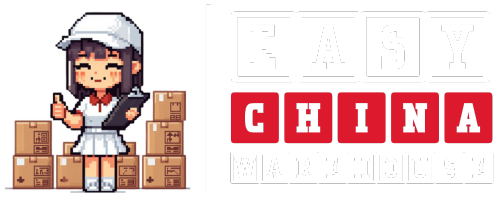Login
Fulfillment Centers in China and Their Benefits for E-commerce Business

Table of content:
- What is a fulfillment center
- What is the difference between a warehouse and a fulfillment center
- Reasons why importers choose fulfillment centers in China
- A list of Fulfillment Centers in Shenzhen, China in 2023
- Why EasyChinaWarehouse can be your fulfillment center
What is a fulfillment center
A fulfillment center, also known as a distribution center or a warehouse, is a facility used by businesses for storing, packaging, and shipping their products to customers. It plays a crucial role in the supply chain management process.
Fulfillment centers are typically large, strategically located warehouses designed to handle a high volume of inventory and streamline the order fulfillment process. They are often operated by e-commerce companies, online retailers, or companies that engage in direct-to-consumer sales.
The primary functions of a fulfillment center include receiving incoming inventory shipments, organizing and storing products, managing inventory levels, picking and packing orders, and preparing them for shipment. Fulfillment centers employ various technologies, such as inventory management systems, barcode scanners, automated sorting systems, and conveyor belts, to optimize efficiency and accuracy in processing orders.
In addition to storage and order fulfillment operations, fulfillment centers may offer value-added services like product customization, gift wrapping, and returns processing. Some fulfillment centers also handle customer service inquiries and handle product exchanges or returns on behalf of the businesses they serve.
By outsourcing fulfillment operations to specialized centers, businesses can focus on other aspects of their operations, such as product development, marketing, and customer acquisition. Fulfillment centers help businesses scale their operations, meet customer demands, and ensure timely and accurate delivery of products to customers.
One example of a well-known fulfillment center is Amazon’s Fulfillment by Amazon (FBA) program. Amazon operates numerous fulfillment centers worldwide to store and distribute products on behalf of sellers who use their platform.
When a seller participates in Amazon FBA, they send their inventory to Amazon’s fulfillment centers. Amazon takes care of storing the products, picking and packing orders, and handling shipping and customer service. This allows sellers to leverage Amazon’s extensive fulfillment network and infrastructure to reach customers quickly and efficiently.
Amazon’s fulfillment centers are highly automated and utilize advanced technologies to manage inventory, track shipments, and streamline order processing. They employ robotics, conveyor systems, and efficient warehouse management systems to handle millions of products and ensure fast and accurate order fulfillment.
Other companies, such as Shopify, ShipBob, and UPS, also operate fulfillment centers to support e-commerce businesses and provide similar services, albeit on a smaller scale compared to Amazon.
These fulfillment centers enable businesses to outsource their warehousing and fulfillment operations, allowing them to focus on growing their businesses and providing excellent customer experiences.
A difference between a warehouse and a fulfillment center
While warehouses and fulfillment centers share some similarities, there are distinct differences between the two:
- Purpose: Warehouses are primarily used for storage, while fulfillment centers serve the purpose of not only storing inventory but also processing orders and facilitating the delivery of products to customers.
- Order Fulfillment: Warehouses are typically designed for bulk storage and inventory management. They store products until they are needed, and the picking and packing of orders are usually handled elsewhere. In contrast, fulfillment centers are equipped with systems and processes to efficiently pick, pack, and ship individual customer orders.
- Technology and Automation: Fulfillment centers often employ advanced technologies and automation systems to streamline order processing. They utilize conveyor belts, sorting machines, and robotics to optimize efficiency and speed. While some warehouses may also have automation in place, it is generally not as extensive as in fulfillment centers.
- Inventory Management: Warehouses focus on managing and organizing inventory. They may use inventory management systems to track stock levels and replenish supplies as needed. Fulfillment centers, in addition to inventory management, have specialized systems that track individual orders, manage order status, and coordinate shipping and delivery.
- Customer Experience: Fulfillment centers play a crucial role in ensuring a positive customer experience. They are responsible for accurately and quickly fulfilling customer orders, handling returns and exchanges, and addressing customer inquiries. Warehouses, on the other hand, are primarily concerned with inventory management and may not directly interact with end customers.
Overall, the key distinction lies in the additional order fulfillment services and technologies provided by fulfillment centers, whereas warehouses focus primarily on storage and inventory management. Fulfillment centers are designed to handle the entire process from receiving products to shipping them out to individual customers, optimizing efficiency and customer satisfaction.
Reasons why importers choose fulfillment centers in China
- You as an e-commerce business owner can get closer to foreign markets. If you are based in another country and want to sell in China or other Asian countries, it’s easier to send your goods to a fulfillment center in China – compared to setting up your own warehouse or sending products from abroad.
- It’s often cheaper to use a fulfillment center to store and pack your products, compared to renting a warehouse and hiring employees. China has low-cost labor, advanced technology, and competitive currency policies that make it an attractive location for warehousing and fulfillment.
- Your international customers get to receive the product in only a few days, rather than waiting for more than a week. China has a well-developed transportation infrastructure and postal system that can deliver products quickly and efficiently to customers around the world.
- You can benefit from the Free Trade Zone advantages. Some fulfillment centers in China are located in the Free Trade Zones, which offer tax incentives, customs clearance, and VAT refund for importers and exporters.
- You can leverage the expertise and experience of the fulfillment center providers. Many fulfillment centers in China have been operating for years and have established relationships with suppliers, carriers, and customs authorities. They can help you navigate the complexity of international selling and provide value-added services such as quality inspection, product sourcing, and branding.

In most cases, fulfillment centers go through the following process:
- Receiving and Inventory Management: The fulfillment center receives incoming shipments of products from suppliers or manufacturers. They inspect the shipments, verify the quantity and quality of the products, and update their inventory management systems accordingly. This step ensures accurate tracking of inventory levels.
- Storage and Organization: The received products are then stored in designated areas within the fulfillment center. The center employs various storage methods, such as shelving, bins, or pallets, depending on the nature of the products. The storage locations are carefully organized to optimize accessibility and efficient picking during the order fulfillment process.
- Order Processing: When a customer places an order, the fulfillment center retrieves the necessary items from their inventory. This is done based on the specific order details received electronically or through an integrated system. The fulfillment center staff collects the items from their storage locations, ensuring accuracy in item selection.
- Picking and Packing: Once the items are gathered, the fulfillment center staff proceeds with the picking and packing process. They carefully pack the items in appropriate packaging materials, ensuring the products are protected during transit. Barcodes or labels are attached to the packages for easy tracking and identification.
- Shipping and Logistics: After the order is packed, the fulfillment center arranges for shipping and delivery. They work with shipping carriers to generate shipping labels and coordinate the transportation of packages to the customer’s location. The fulfillment center may have partnerships or negotiated shipping rates with various carriers, allowing for efficient and cost-effective shipping options.
- Order Tracking and Customer Service: Fulfillment centers often provide order tracking information to customers. They update the order status in their system and provide tracking numbers that customers can use to monitor the progress of their shipment. Fulfillment centers may also handle customer inquiries, address any issues, and provide support related to order fulfillment and delivery.
- Returns Processing: If customers need to return or exchange products, the fulfillment center handles the returns process. They receive the returned items, inspect them for any damage or discrepancies, update the inventory accordingly, and process the appropriate refunds or exchanges as per the business’s policies.
Throughout this entire process, fulfillment centers utilize various technologies, such as inventory management systems, barcode scanners, and order management software, to ensure accurate and efficient order fulfillment. They prioritize speed, accuracy, and customer satisfaction to provide a seamless experience for both the e-commerce business and its customers.
A list of Fulfillment Centers in Shenzhen, China
- SF Express: A leading courier service provider in China that also provides warehousing and fulfillment services for e-commerce merchants.
- Asendia: A global postal operator that specializes in cross-border e-commerce delivery solutions.
- DPEX Worldwide: A regional express service provider that covers Asia Pacific and the Middle East.
- Easy China Warehouse: An e-commerce fulfilment warehouse and freight forwarding company. Easy China Warehouse (ECW) acts as e-commerce companies end to end supply chain solution provider for all their manufacturing in China. ECW can arrange your cargo to be shipped anywhere in the world for the lowest landed cost.
Why EasyChinaWarehouse can be your fulfillment center
Using Easy China Warehouse in China as a fulfillment center offers several benefits for e-commerce companies.
- Cost-effectiveness
Easy China Warehouse provides cost-effective solutions for e-commerce companies by offering competitive warehousing and fulfillment services. They leverage economies of scale, allowing businesses to benefit from reduced warehousing costs, optimized shipping rates, and efficient order fulfillment processes. This cost-effectiveness helps e-commerce companies maximize their profit margins. - Efficient order processing
With Easy China Warehouse’s advanced technology and streamlined processes, e-commerce companies can experience efficient order processing. From receiving inventory to picking, packing, and shipping orders, the warehouse employs automated systems and skilled staff to ensure fast and accurate order fulfillment. This efficiency helps e-commerce businesses meet customer expectations for prompt deliveries. - Inventory management
Easy China Warehouse offers comprehensive inventory management services, allowing ec-ommerce companies to have real-time visibility into their stock levels. With sophisticated inventory tracking systems, businesses can monitor their inventory, set up reorder points, and efficiently manage stock replenishment. Accurate inventory management prevents stockouts and overstocking, minimizing fulfillment errors and improving customer satisfaction. - International shipping expertise
China is a major hub for global e-commerce, and Easy China Warehouse specializes in international shipping. They have extensive experience and knowledge of shipping regulations, customs procedures, and documentation requirements. E-commerce companies benefit from their expertise, ensuring smooth cross-border shipping and reducing the risk of delays or complications. - Scalability and flexibility
Easy China Warehouse offers scalable and flexible solutions, allowing e-commerce companies to adapt to changing business needs. Whether a business experiences seasonal fluctuations in demand or plans to expand into new markets, the warehouse can accommodate varying order volumes and provide tailored solutions. This scalability and flexibility enable e-commerce businesses to grow without worrying about warehousing and fulfillment limitations.
By leveraging Easy China Warehouse’s expertise, e-commerce companies can efficiently drive sales growth in their business by serving more customers globally.
Contact us to get a free consultation!
